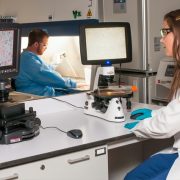Winthrop P. Rockefeller Cancer Institute
The Winthrop P. Rockefeller Cancer Institute at The University of Arkansas for Medical Science (UAMS) is known for its integrative approach to cancer treatment as well as the specialized care that it provides each patient.
Medical professionals of many different disciplines, such as medical oncologists, surgeons, pathologists, researchers, and radiologists join together in order to devise novel treatment techniques for each individual patient.
The super-qualified lung cancer program is well versed in treating pleural mesothelioma; every week, they meet together in order to discuss each patient’s treatment and progress.
Individualized Care at Rockefeller
The physicians at the cancer center understand that every case is different, and every individual requires a slightly different treatment regimen. The ideal treatment plan at Winthrop P. Rockefeller is one that has minimal side effects, while at the same time, achieving maximum results. The doctors want to ensure that those suffering from mesothelioma lead the most enjoyable lives possible while undergoing treatment at the facility. Rockefeller is the only cancer treatment location in the state of Arkansas that has been designated at comprehensive cancer treatment facility; this is because they have taken advantage of the most novel technologies, procedures, and breakthroughs in medicine. Physicians at the institute are allowed access to clinical trials as well as genetic testing that pushes their standard past what is available to the general public.
Three thousand patients every year in the United States are impacted by mesothelioma and other asbestos-related diseases.
Rockefeller’s multimodality approach towards the treatment of mesothelioma usually includes a mix of radiation therapy, chemotherapy, and sometimes surgery. Immunotherapy, gene, therapy, and other alternative therapies are also considered, although these techniques are less commonly used.
Dr. Konstantinos Arnaoutakis and his colleague Dr. Matthew Steglia are assigned to the hospital’s cases of pleural mesothelioma; mesothelioma and its related ailments are most commonly caused from occupational exposure to asbestos that has developed into full-blown cancer.
Dr. Steglia is a specialist in the field of lung cancer within thoracic oncology. He also has specialized knowledge and experience in treating esophageal cancer as well as other thoracic malignancies. Before his time at Rockefeller, Dr. Steglia was employed at the M.D. Anderson Cancer Center in Houston, Texas.
Support Staff at Rockefeller
At Rockefeller, the lung cancer task force includes specialists who help patients with quitting smoking; these clinics for nicotine-addicted patients have a success rate of seventy percent with helping these patients quit using tobacco.
Other specialists include interventional radiologists, geneticists, palliative care specialists, and a lung cancer support community that contains social workers, pharmacists, dietitians, and other professionals that are available to provide whatever the patient may need at any given time.
Dr. Peter Emanuel was appointed as the director of the University of Arkansas Cancer Institute in 2007; this was the same year that the name was switched to the Winthrop P. Rockefeller Cancer Institute. The name was changed in order to pay respects to the Arkansas lieutenant governor of the same name. With Dr. Emanuel’s leadership, the cancer center revolutionized its clinical programs, outreach programs, and clinical trial initiatives; it was set upon the path towards becoming a National Cancer Institute (NCI) designated Comprehensive Cancer Center, one of the highest distinctions that a cancer care institution. can receive.
